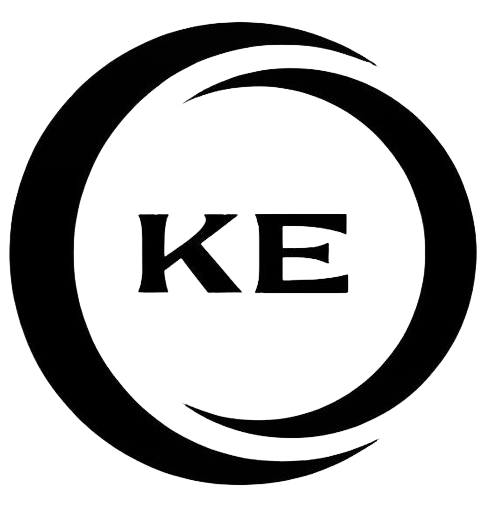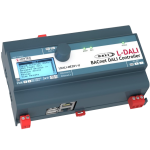
The L-ROC Room Controller provides the basis for a revolutionary room automation system based on IP, which seamlessly integrates with native BACnet/IP networks and LonMark Systems at the controller level. Together with the L-STUDIO software flexible room solutions can be created with little effort and changed on demand. An integral part of the L-ROC System is a Web based room operation via an LWEB‑803/802 dashboard and the automatic generation of graphics for the L-VIS Touch Panel for local operation. For CEA‑709 room control units, CEA‑709 multi-sensors and other CEA‑709 devices can be connected via the LonMark TP/FT-10 channel on the L-ROC controller. Local inputs and outputs are provided via L-IOB I/O Modules. KNX S-mode devices can be connected through KNX TP1 by using the optional LKNX-300 module.
Flexible Room Concept for Room Automation
A room segment is the base unit of configuration in the L-ROC System. The L-ROC Library provides a set of functions for every window axis including:
- Lighting control with constant light controller
- Sun blind control with angle adjustment and year shade progression
- Temperature control for heating, cooling, and ventilation
- Occupancy detection
- Window monitoring
Each L-ROC Room Controller can handle up to 16 room segments. Based on the various room segment types, larger buildings can be modeled in a hierarchical manner. Areas are built with an area manager by combining multiple room controllers. A floor manager manages multiple areas in one floor. Depending on the architecture, the building can be split up into areas and floors as needed.
Area/Floor Managers are responsible for handling functions needed for corridor, staircase, and bathroom lighting, or even ventilation. Floor managers facilitate the data communication between the floors and handle floor relevant functions.
Rooms can now be created arbitrarily in any size by moving, building, or removing partition walls. The resulting logical connections between the L-ROC Room Controllers will be built automatically. All graphical user interfaces and network connections are automatically generated and adapted respectively.
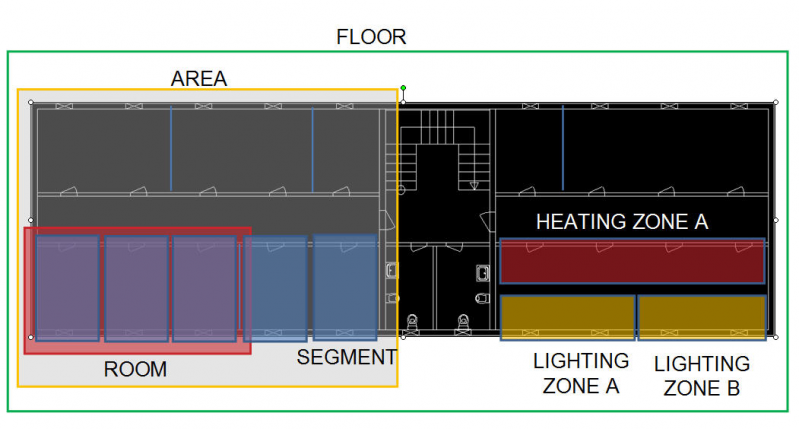
AST™ for Every Room Segment
L-ROC provides a set of functions for Alarming, Scheduling, and Trending (AST™) for every room segment. Each room segment can be operated entirely independently. The AST™ functions are fully available to higher-level systems through BACnet/IP and Web services (L-WEB System). Distributed schedulers can be efficiently managed and changed with LWEB-900.
Room Communication through redundant or separated IP Network
L‑ROC Room Controllers are interconnected via a 100Base-T Ethernet network. Each L-ROC device is equipped with two Ethernet ports. It can either be configured to use the internal switch to interconnect the two ports or every port is configured to work in a separate IP network.
When the Ethernet ports are configured for two separate IP networks, one port can be connected for instance to a WAN (Wide Area Network) with enabled network security (HTTPS) while the second port can be configure to be connected to an insecure network (LAN) where the standard building automation protocols like BACnet/IP, LON/IP, or Modbus TCP are present. These devices also feature firewall functionality of course to isolate particular protocols or services between the ports.
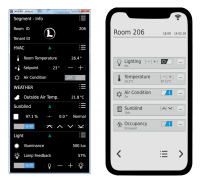
Using the internal switch, a daisy chained line topology of up to 20 devices can be built, which reduces costs for network installation. The IP switch also allow the setup of a redundant Ethernet installation (ring topology), which increases reliability. The redundant Ethernet topology is enabled by the Rapid Spanning Tree Protocol (RSTP), which is supported by most managed switches.
Integrated L-WEB Room Operation
L-ROC controllers provide graphical user interfaces for room operation directly via an IP connection to the user, without the need for an additional web server. Graphic projects are distributed among the L-ROC Room Controllers and can be accessed by LWEB‑802/803 from any PC workstation, smart phone, or tablet PC running Android or iOS.
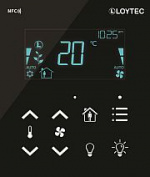
Integration of the L-STAT Network Thermostat
Per L-ROC Room Controller up to 16 L-STAT room control devices can be integrated into building automation via Modbus RTU (RS-485) interface. In addition to the attractive, modern design and intuitive operation, L-STAT provides a range of other features to individually increase the room comfort.
Internal sensors measure temperature, humidity, condensation, occupancy, and also the CO2 value of the air. There is also the possibility to control room functions from remote via an IR remote control. Standard pushbuttons and external temperature sensors can be integrated through additional inputs.
Connection to Higher-Level Systems
Higher-level systems can seamlessly integrate L-ROC Room Controllers via BACnet/IP, LonMark IP-852, or Web services (OPC).
All these protocols are simultaneously available. It is possible to integrate the L-ROC Room Controller in a BACnet Operator Workstation and at the same time L‑ROC will communicate with other CEA‑709 devices on the IP-852 channel. Moreover, a higher-level SCADA or ERP System (Facility Management) gets information directly from the L-ROC Room Controller by using Web services based on OPC.
Full LWEB-900 Support
The L-WEB System uses Web services to communicate with the L-ROC System. All device and operating parameters of every single L-ROC Room Controller are automatically synchronized with the LWEB-900 SQL database by the LWEB-900 client or the LWEB‑900 Master Device Manager. The parameters are available to all L-WEB client applications.
I/O Integration via Plug and Play
The L‑ROC Room Controllers can automatically integrate physical I/Os by using L-IOB I/O Modules. Up to 24 L-IOB I/O Modules can be connected through LIOB‑Connect, LIOB-FT, or LIOB-IP. All I/Os can be used by the L-ROC application and are also available via the Web interface of L-ROC. All configurations of the L-IOB Modules are stored on the L-ROC and loaded on demand into the L-IOB I/O Modules. Exchanging I/O modules is done without any configuration effort requiring only a few quick configuration steps.
Year Shade Progression
Especially in dense city areas, buildings can cast shadows on each other. In case a façade element is shaded by another building, sunblinds can be deactivated for better daylight harvesting. The high-performance L-ROC controllers allow to calculate a 3D model in dxf-Format of the building and its close-by neighbors. The model can be constructed using common 3D CAD software or can be derived from a Building Information Model. In case the scenery changes due to new constructions, only the new buildings have to be inserted in the model. The calculation can be done for each window individually or per shadowing zone.
IoT Integration
The IoT function (Node.js) allows connecting the system to almost any cloud service, either for uploading historical data to analytics services, delivering alarm messages to alarm processing services or operating parts of the control system over a cloud service (e.g., scheduling based on Web calendars or booking systems). Processing Internet information such as weather data in forecast-based control is also possible. Finally, the JavaScript kernel also allows implementing serial protocols to non-standard equipment.
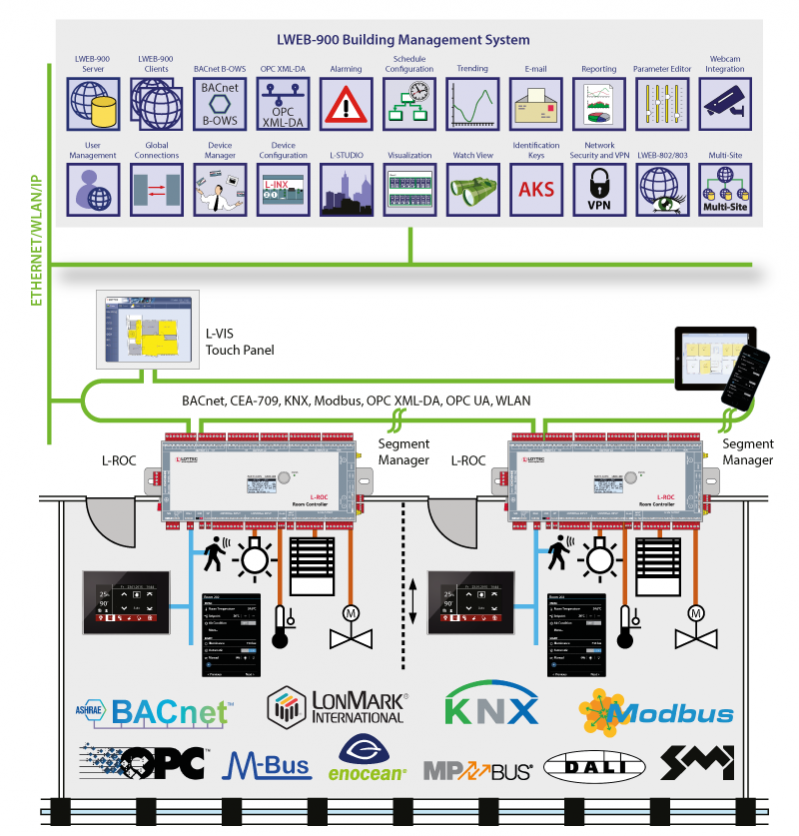
Features
- Flexible built-in management for room segments
- Room controller for up to 16 room segments
- Networking via redundant or separated IP network
- Programmable with L‑STUDIO (IEC 61499)
- Extension with physical inputs and outputs using L‑IOB I/ O Modules (LIOB‑11x, LIOB‑15x, and LIOB‑45x/55x)
- 128×64 graphic display with backlight
- Local display of device and data point information
- Manual operation using the jog dial or VNC Client
- Integrated AST™ functions (Alarming, Scheduling, and Trending) for each room segment
- Node.js support for easy IoT integration (e.g. Google calendar, Alexa & friends, multimedia equipment,…)
- Event-driven e-mail notification Math objects to execute mathematical operations on data points
- Stores customized graphical pages
- Visualization of customized graphical pages through LWEB‑900 (Building Management), LWEB‑803 (Monitoring and Control), or LWEB‑802 (Web Browser)
- Support of the L‑STAT Room Operator Panel
- Built-in OPC XML‑DA and OPC UA server
- Dual Ethernet/ IP interface
- Access to network statistics
- Compliant with ANSI/ ASHRAE 135‑2012 and ISO 16484‑5:2012 standard
- Supports BACnet MS/TP, BACnet/IP or BACnet/SC
- BACnet Client Function (Write Property, Read Property, COV Subscription)
- BACnet Client Configuration with configuration tool (scan and EDE import)
- BACnet/ IP compliant with B-BC (BACnet Building Controller) functionality
- Compliant with CEA‑709, CEA‑852, and ISO/ IEC 14908 Standard (LonMark System)
- Connection of any CEA‑709 device via TP/ FT‑10 channel
- CEA‑709 integration via LonMark IP‑852 (Ethernet/ IP) channel
- Support of dynamically created or static NVs
- Support of user-defined NVs (UNVTs) and Configuration Properties (SCPTs, UCPTs)
- Integrated BACnet/ IP to BACnet/SC and BACnet MS/ TP Router including BBMD as well as Slave-Proxy functionality
- Integrated IP‑852 to TP/FT‑10 Router
- Connection to KNXnet/ IP directly, KNX TP1 via LKNX‑300 Interface
- M‑Bus Master according to EN 13757‑3, connection via optional M‑Bus Converter (L‑MBUS20 or L‑MBUS80)
- Gateway functions including Smart Auto-Connect™
- Modbus TCP and Modbus RTU/ASCII (Master or Slave)
- Integrated web server for device configuration and monitoring data points
- Configurable via Ethernet/ IP
- Connection to EnOcean wireless devices via LENO‑80x Interface
- Supports WLAN through LWLAN‑800 Interface
- Supports MP-Bus through LMPBUS-804 Interface
- Supports SMI (Standard Motor Interface) through LSMI-80x
- Supports LTE through LTE-800 Interface
- Stores user-defined project documentation
L-ROC Room Automation – Video
LROC-102 Room Controller Products
LROC-102

L-ROC Room Controller for room segment, aisle, floor, building, or campus management
LROC-SEG8

License to add 8 segments to L-ROC controller
L-STUDIO
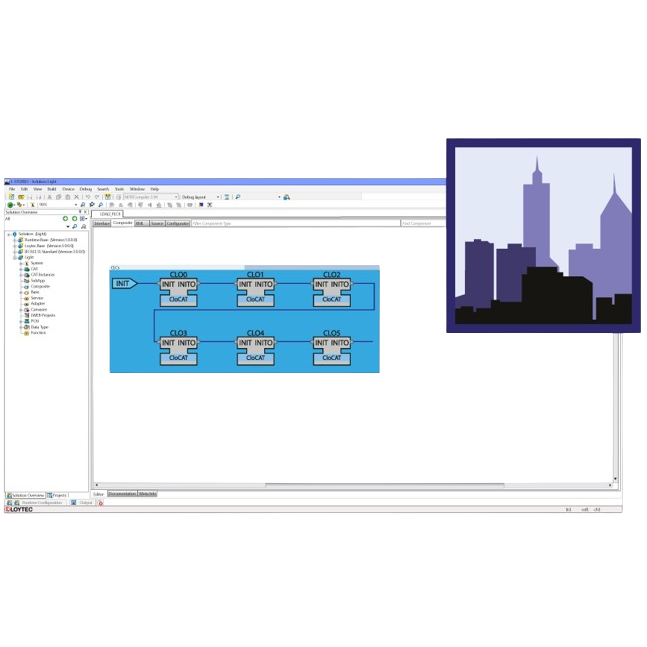
Device configuration and programming suite
LSTAT-80x-CUSTOM

One-time customization cost for L-STAT custom design, including 2 working samples
LIOB-A2

L‑IOB Adapter 2 to split the LIOB‑Connect bus using 4-wire cables
LIOB-A4

L‑IOB Adapter 4 to split the LIOB‑Connect bus using RJ45 network cables
LIOB-A5

L‑IOB Adapter 5 to terminate the LIOB-Connect bus
LIOB-100
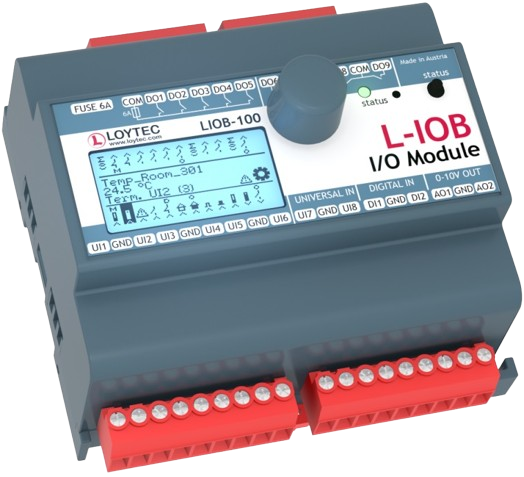
LIOB-Connect I/O Module: 8 UI, 2 DI, 2 AO, 9 DO (5 x Relay 6 A, 4 x Triac 0.5 A)
LIOB-101
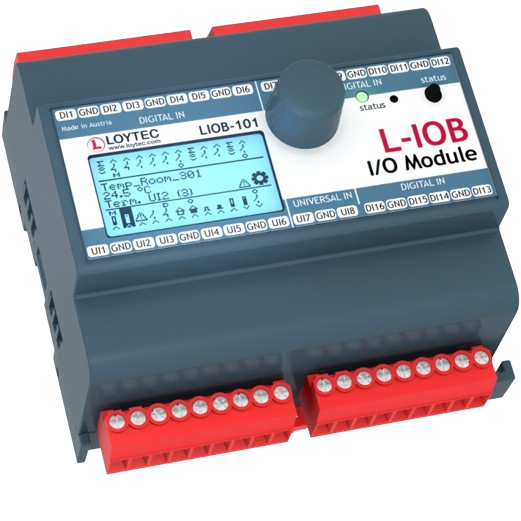
LIOB-Connect I/O Module: 8 UI, 16 DI
LIOB-102
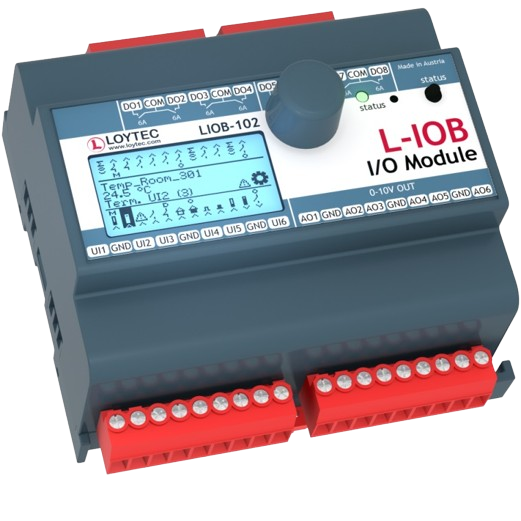
LIOB-Connect I/O Module: 6 UI, 6 AO, 5 DO (5 x Relay 16 A)
LIOB-110
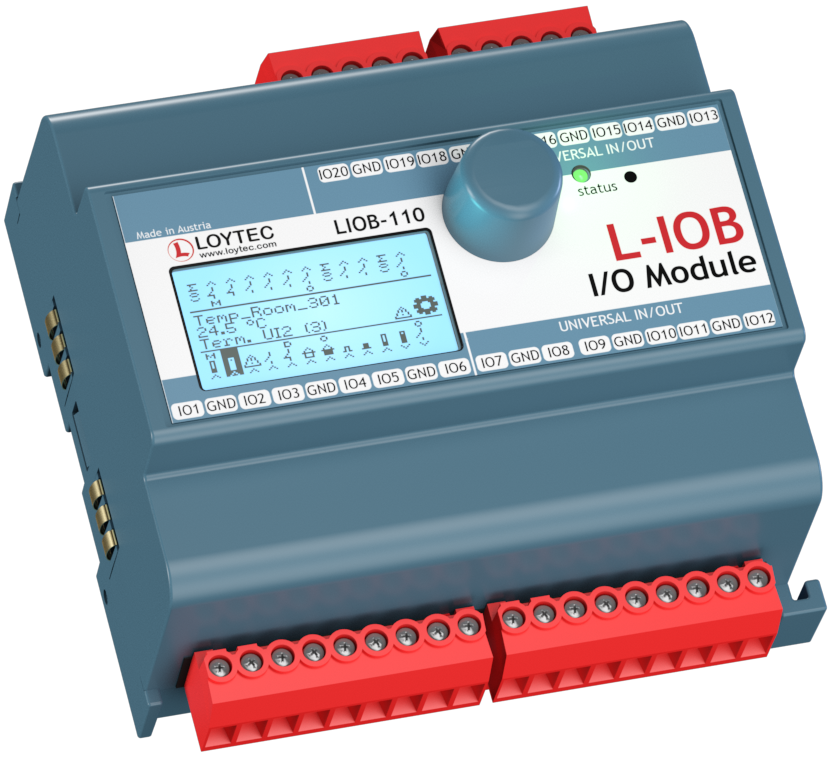
LIOB-Connect I/O Module: 20 Universal I/O (IO)
LIOB-112
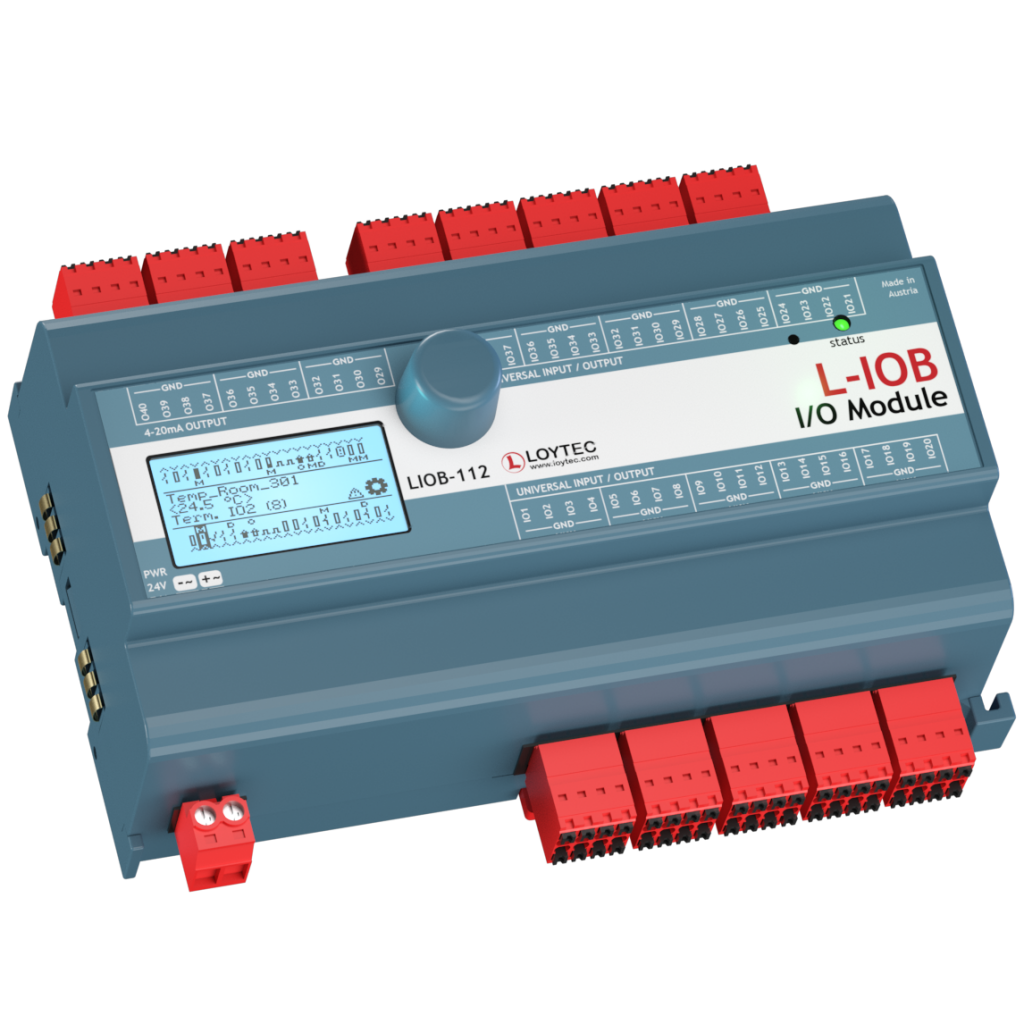
LIOB-FT I/O Module: 8 UI, 2 DI, 2 AO, 8 DO (4 x Relay 6 A, 4 x Triac 0.5 A)
LIOB-151
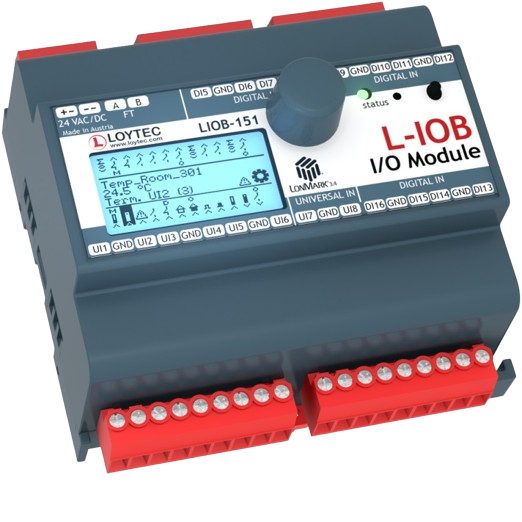
LIOB-FT I/O Module: 8 UI, 12 DI
LIOB-152
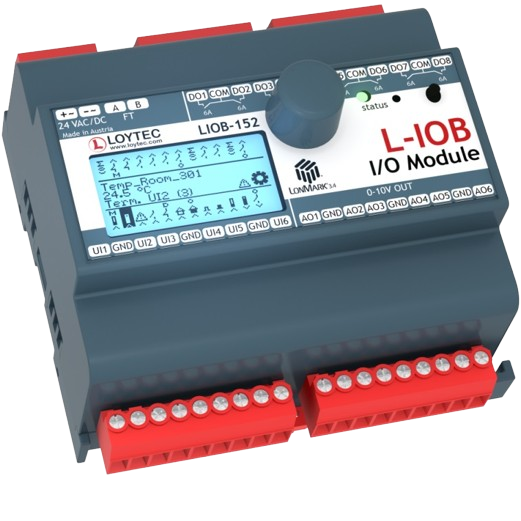
LIOB-FT I/O Module: 6 UI, 6 AO, 8 DO (8 x Relay 6 A)
LIOB-153
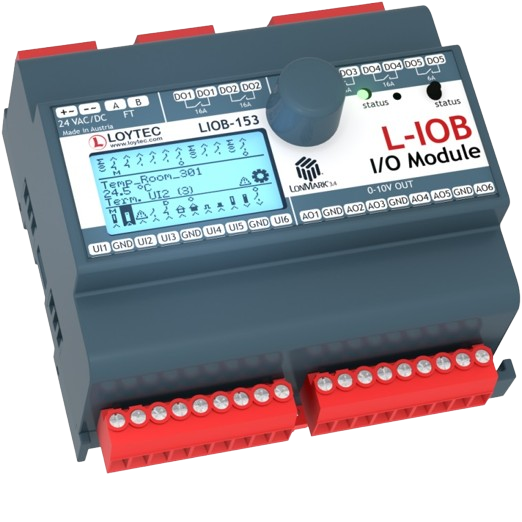
LIOB-FT I/O Module: 6 UI, 6 AO, 5 DO (4 x Relay 16 A, 1 x Relay 6 A)
LIOB-154
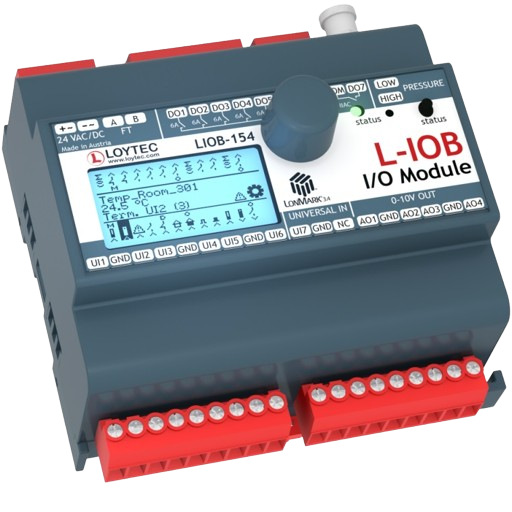
LIOB-FT I/O Module: 7 UI, 4 AO, 7 DO (5 x Relay 6 A, 2 x Triac 0.5 A), 1 Pressure Sensor
LIOB-450

LIOB-IP852 I/O Module: 8 UI, 2 DI, 2 AO, 8 DO (4 x Relay 6 A, 4 x Triac 0.5 A)
LIOB-451

LIOB-IP852 I/O Module: 8 UI, 12 DI
LIOB-452

LIOB-IP852 I/O Module: 6 UI, 6 AO, 8 DO (8 x Relay 6 A)
LIOB-453

LIOB-IP852 I/O Module: 6 UI, 6 AO, 5 DO (4 x Relay 16 A, 1 x Relay 6 A)
LIOB-454

LIOB-IP852 I/O Module: 7 UI, 4 AO, 7 DO (5 x Relay 6 A, 2 x Triac 0.5 A), 1 Pressure Sensor
LIOB-550
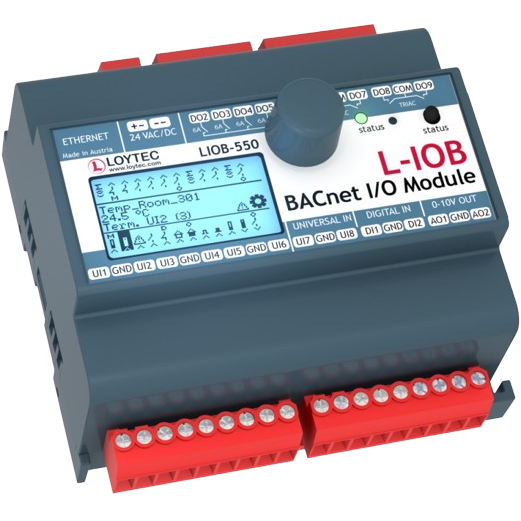
LIOB-BIP I/O Module: 8 UI, 2 DI, 2 AO, 8 DO (4 x Relay 6 A, 4 x Triac 0.5 A)
LIOB-551
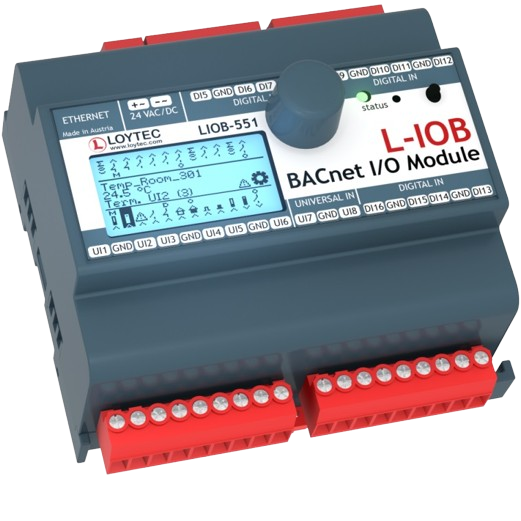
- LIOB-BIP I/O Module: 8 UI, 12 DI
LIOB-552
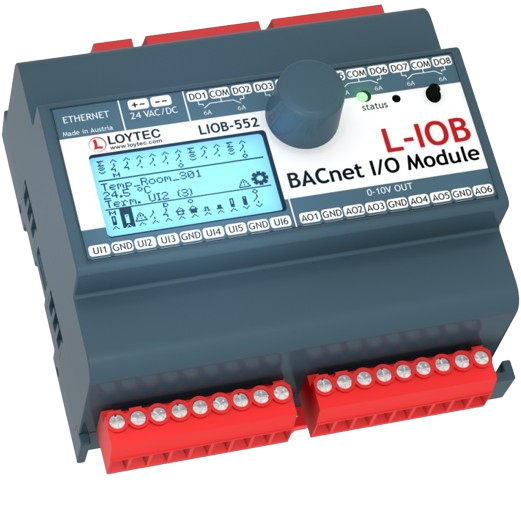
LIOB-BIP I/O Module: 6 UI, 6 AO, 8 DO (8 x Relay 6 A)
LIOB-553
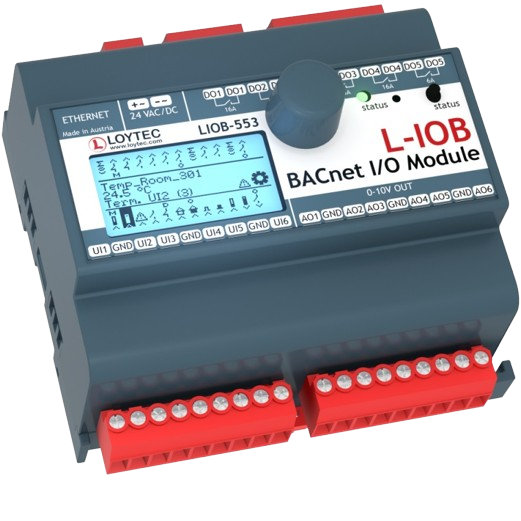
LIOB-BIP I/O Module: 6 UI, 6 AO, 5 DO (4 x Relay 16 A, 1 x Relay 6 A)
LIOB-554
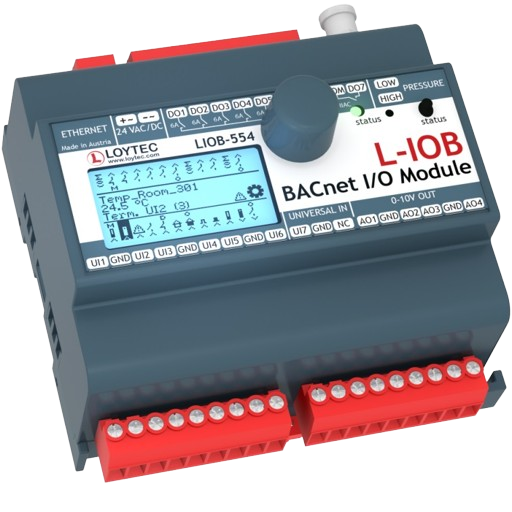
LIOB-BIP I/O Module: 7 UI, 4 AO, 7 DO (5 x Relay 6 A, 2 x Triac 0.5 A), 1 Pressure Sensor
LPOW-2415A
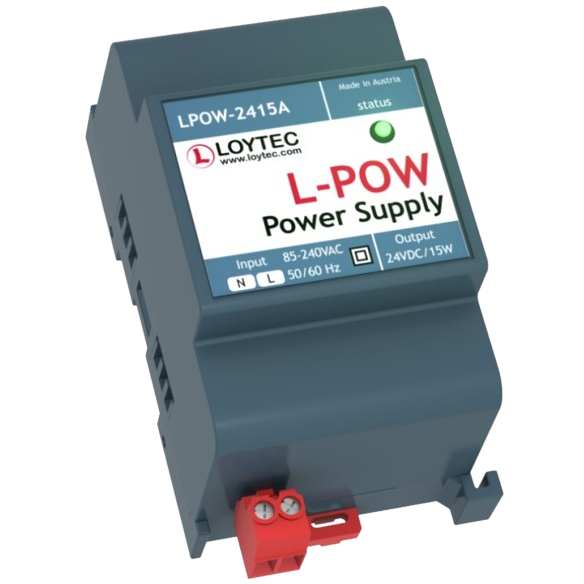
LIOB-Connect Power Supply, 24 VDC, 15 W
LPOW-2415B
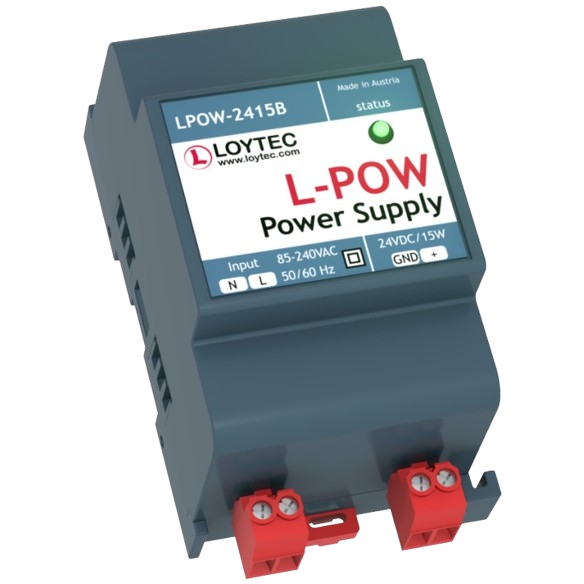
Power supply unit with power connector 24 VDC, 15 W
LSMI-800
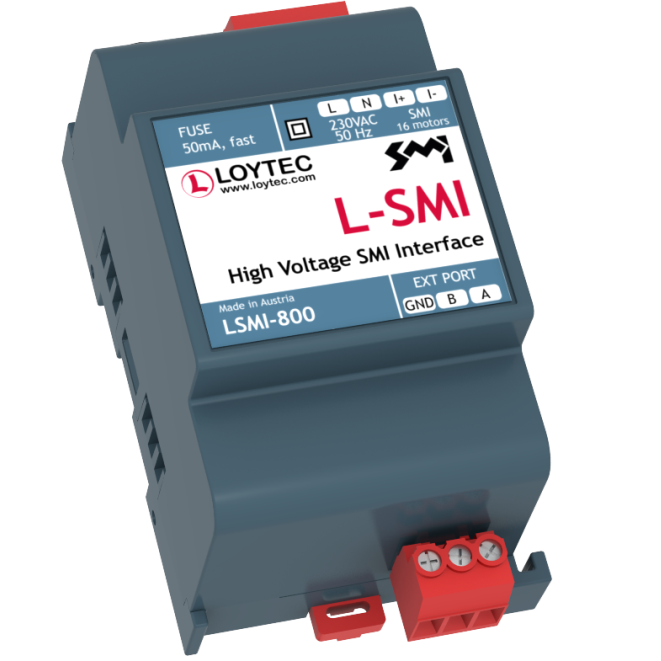
Standard Motor Interface for 16 motors via EXT port
L-MBUS20
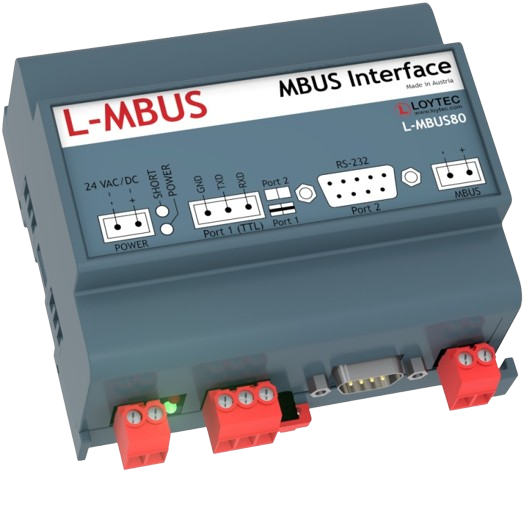
M-Bus level converter, interface for 20 M-Bus devices
L-MBUS80

M-Bus Level Converter, Interface for up to 80 M-Bus devices
LKNX-300
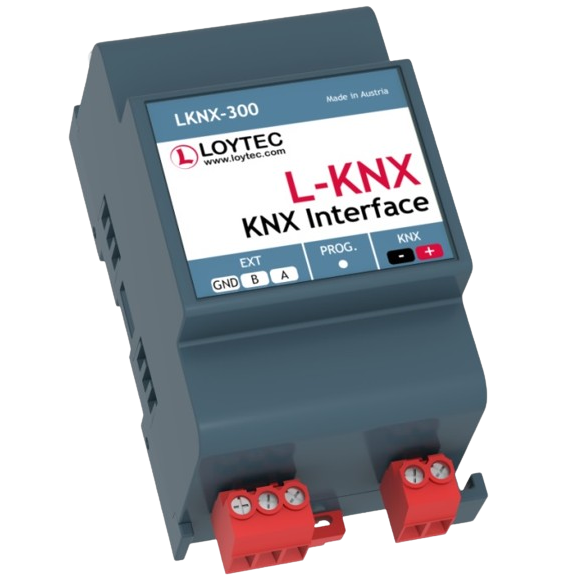
KNX interface to connect KNX TP1 devices
LENO-800
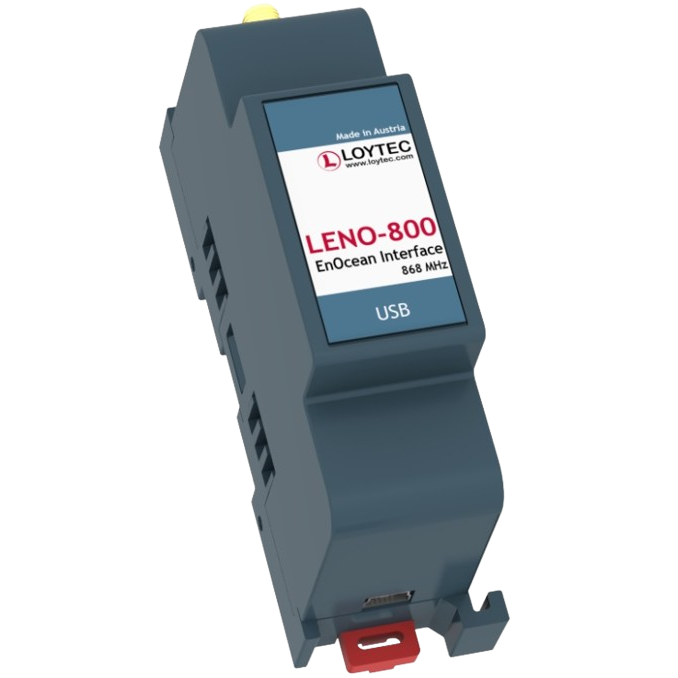
EnOcean Interface 868 MHz Europe
LENO-801
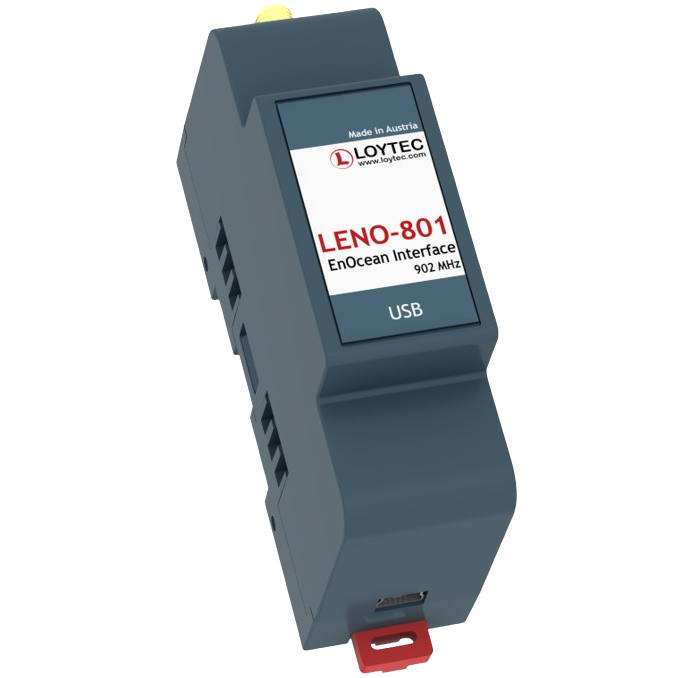
EnOcean Interface 902 MHz USA/Canada
LENO-802
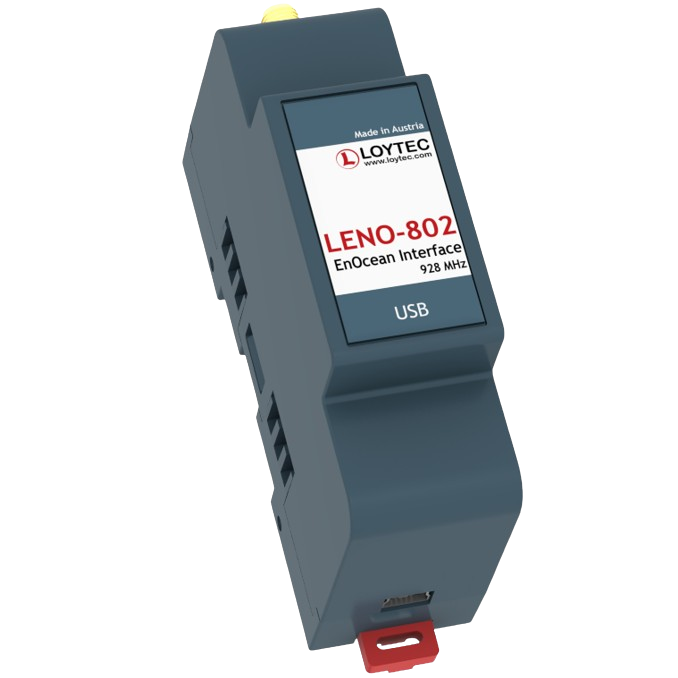
EnOcean Interface 928 MHz Japan
LWLAN-800
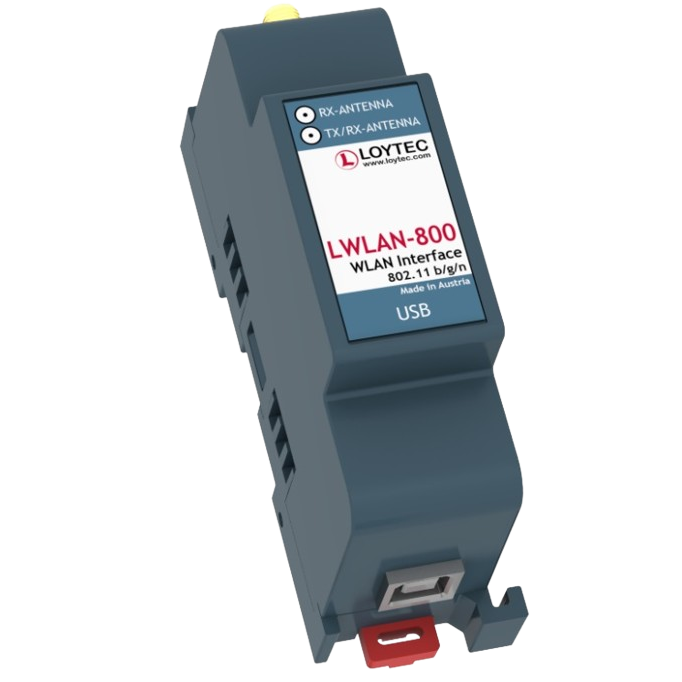
Wireless LAN Interface IEEE 802.11bgn
LRS232-802
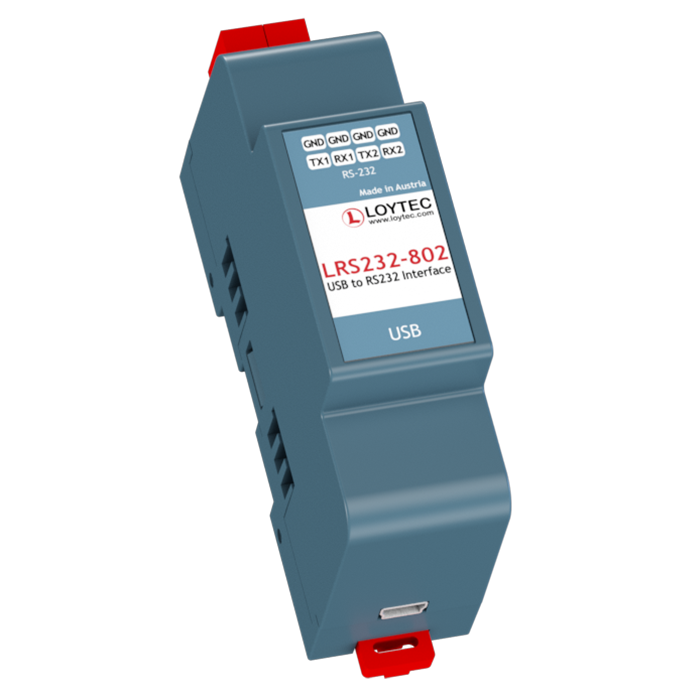
USB to 2x RS-232 Interface
LBOX-600

L-BOX System Distribution Box for room automation components, 600 x 250 x 82 (L x W x H in mm)
LSTAT-810-G3-L0

Remote EnOcean Antenna, Europe, White
LSTAT-820-G3-L0

Remote EnOcean Antenna, USA/CA, White
LSTAT-830-G3-L0

Remote EnOcean Antenna, Japan, White
LIOB-560

LIOB-BIP I/O Modul: 20 Universal I/O (IO)
LIOB-562

LIOB-BIP I/O Module: 40 Universal I/O (12 optionally with 4-20 mA Current Output)
